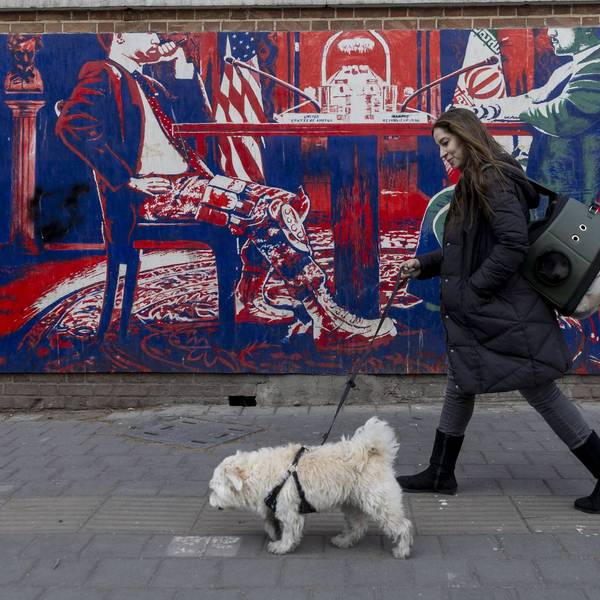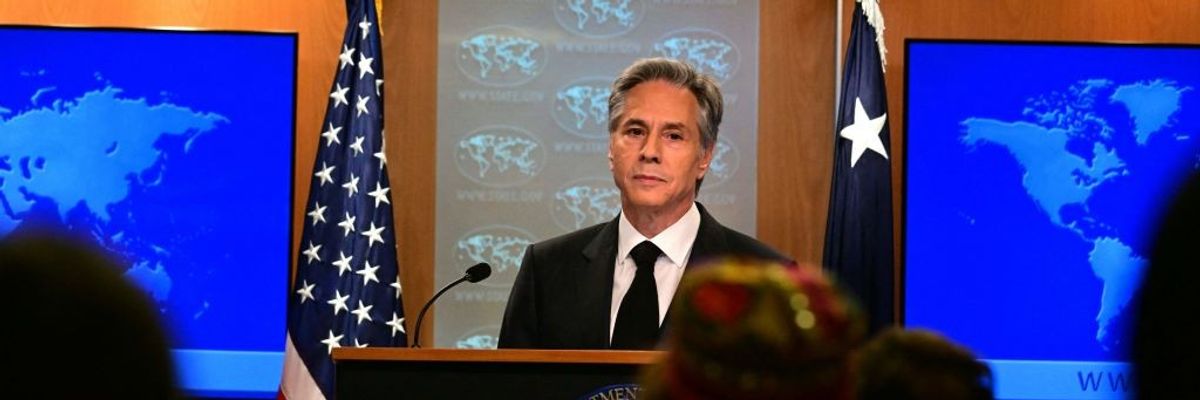The Biden administration has reportedly reached an agreement with Qatar to deny Iran access to a $6 billion humanitarian aid fund in the wake of Hamas' deadly attack on Israel, even though there's no evidence that Iran was directly involved.
According to Punchbowl, Deputy U.S. Treasury Secretary Wally Adeyemo privately told House Democrats on Thursday that the assets—which are proceeds from Iranian oil sales—aren't "going anywhere anytime soon," a comment also reported by The Washington Post.
The Biden administration agreed last month to make the assets available to Iran only for humanitarian purposes as part of a prisoner swap deal. The money is currently held in Qatari banks.
CBS News reported Thursday that the U.S. has "reached a 'quiet understanding' with Qatar not to release any of the $6 billion in Iranian oil revenues." The Post and The New York Times also reported the agreement.
News of the deal with Qatar comes after Republicans and some Democrats urged the White House to "freeze" the Iranian assets following a Wall Street Journal report alleging that Iran's security officials "helped plot" Hamas' attack on Israel over a period of "several weeks."
In a CNN interview earlier this week, Sen. Lindsey Graham (R-S.C.) used the Journal's reporting to call for a military attack on Iran.
But National Security Advisor Jake Sullivan said during a press briefing earlier this week that the U.S. doesn't currently have any evidence indicating that Iran was involved in the October 7 attack, an assessment confirmed by a preliminary U.S. intelligence assessment.
Nir Dinar, a spokesperson for the Israel Defense Forces (IDF), told Politico that the Israeli government also has "no evidence or proof" that Iran was behind the attack.
Iran has denied involvement in the Hamas assault and criticized U.S. lawmakers for targeting the $6 billion in assets.
"The money rightfully belongs to the people of Iran, earmarked for the government of the Islamic Republic of Iran to facilitate the acquisition of all essential and non-sanctioned requisites for the Iranians," Iran's mission to the United Nations told the Post in a statement.
"Lawmakers who propose the funds be 'frozen' are implying that they should be blocked from being used to purchase food and medicine, despite humanitarian exemptions built into U.S. law."
Jamal Abdi, president of the National Iranian American Council (NIAC), wrote on social media that the Biden administration's reported agreement with Qatar is "such self-defeating cowardice" and "a purely political move to cave to bad-faith critics," such as those who alleged without a shred of evidence that Iran used some of the $6 billion in assets to fund Hamas' attack on Israel.
The U.S. Treasury Department refuted such claims, saying that "not a penny" of the money has been spent and emphasizing it "can only be used for future humanitarian-related purposes." Under the terms of the prisoner-swap deal with Iran, U.S. officials had to approve each transaction involving the $6 billion in assets, the Post noted.
U.S. Secretary of State Antony Blinken echoed that point in response to questions about the Iranian assets on Thursday, telling reporters that "we have strict oversight of the funds and we retain the right to freeze them."
Blinken did not confirm or deny that the Biden administration has decided to block Iran from accessing the account for humanitarian purposes. In a subsequent interview with NBC News, Blinken repeated that the U.S. had no evidence that Iran was involved in the planning or execution of Saturday's attacks in Israel, but nonetheless said it had the right to withhold the money.
Abdi warned that violating the deal with Iran "risks enormous actual blowback and undermining of U.S. diplomatic power."
NIAC policy director Ryan Costello expressed a similar concern in a column for Responsible Statecraft on Thursday, writing that "this knee-jerk reaction seems to dismiss out of hand any possibility of determining whether Iran could conceivably be an interlocutor for getting hostages freed from Hamas."
"The Trump administration did untold damage to U.S. credibility by reneging on the multilateral 2015 nuclear deal with Iran struck under the Obama administration," Costello wrote. "Reneging on a hostage deal would double down on this error and further diminish U.S. diplomatic credibility, and Biden’s credibility in particular, with a range of adversarial nations. This would undoubtedly make it much more difficult to get Americans home safely from a host of places—including potentially Gaza."
Costello stressed that the Biden administration did not "unfreeze" the Iranian funds, but allowed them to be transferred to Qatar from South Korea, which the Trump administration granted waivers in 2018 to continue purchasing Iranian oil despite U.S. sanctions. The Biden administration then put in place restrictions preventing the funds from being used for any purpose other than humanitarian needs, such as food and medicine.
"Lawmakers who propose the funds be 'frozen' are implying that they should be blocked from being used to purchase food and medicine, despite humanitarian exemptions built into U.S. law," Costello wrote.




